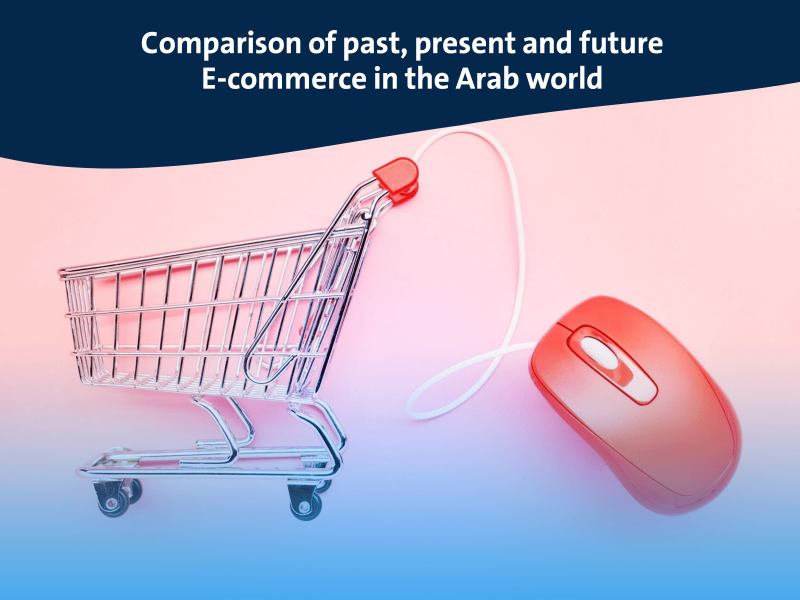Technology has developed greatly over the past years, which led to the emergence of the concept of electronic commerce, which has become considered one of the most important means of buying and selling in our modern era. This method is one of the best options for entrepreneurs and companies to increase sales and reduce costs. In this article, I will review a comparison between e-commerce in the past and the present, and we will also discuss the future of e-commerce in the Arab world.
1. Electronic commerce: an introduction to digital transformation in the Arab world.
E-commerce is one of the richest and fastest developed economic sectors throughout history, and the Arab region has witnessed a rapid digital transformation in recent years. Digital transformation can act as a catalyst for the development of many economic sectors in the Arab regions, and to get acquainted with the broad prospects that e-commerce can offer, we must study the past, present and future expectations. It is important to bear in mind that this digital transformation may bring many challenges, but it still presents countless opportunities for economic growth and job creation.
2. The e-commerce revolution in the Arab world: past and present.
In the past, e-commerce was limited in the Arab world, but with the technological progress we have today, Internet commerce has developed dramatically. E-commerce has become widespread and very popular, as business operations on the Internet have become easier, faster and safer. E-commerce also provides consumers with the broadest range of products and services to choose from in the Arab world, stimulating business development and expanding the market. The development of e-commerce can contribute to the development of the national economy in the region, as many people prefer online shopping rather than going to traditional stores, which leads to increased sales and new job opportunities in the Arab world.
3. Electronic commerce in the Arab world: opportunities and challenges.
E-commerce in the Arab world has witnessed remarkable development in the recent period, and many opportunities and challenges associated with this digital transformation have emerged. On the one hand, e-commerce contributes to increasing opportunities for commercial communication between Arab countries and the world, and enabling individuals and companies to access new markets and increase their income. Some examples of this include the development of e-commerce companies such as Jumia, Souq.com, Namshi.com and eBay in the Arab region. However, digital transformations in e-commerce are accompanied by many ongoing challenges, such as security, legal and technical challenges, as well as challenges related to high shipping costs and lack of confidence in digital identity and secure payment. In addition, electronic commerce in the Arab world is witnessing a major challenge, as there is no strong infrastructure in many Arab countries, and this negatively affects the economic growth associated with this type of trade. In the end, the Arab world needs to make more efforts to face these challenges and to take full advantage of the opportunities available in the field of electronic commerce.
E-commerce developments in the Arab world: What have we achieved so far?
E-commerce is one of the important developments witnessed by the Arab countries in recent years, as many countries in the region are seeking to enhance this sector and improve its performance. These countries have witnessed major developments in electronic commerce, as these developments have led to an increase in the volume and diversity of electronic commerce, and to providing opportunities for companies and individuals to expand their scope of work and increase their revenues. Although some successes have been achieved in this field, there are many challenges facing this sector in the future, including technological challenges and economic challenges. However, challenges can continue to improve and develop this sector, providing new opportunities for individuals and companies in the Arab world.
5. The future of electronic commerce in the Arab world: possible scenarios.
In this study, the research team reviews potential scenarios for the future of e-commerce in the Arab world. Among these scenarios, we could live in a future world that far exceeds the capabilities of e-commerce at the present time. This could include the use of emerging technology such as artificial intelligence, blockchain technology and other developments, which will increase the expansion and accessibility of e-commerce platforms. Accordingly, electronic commerce can unify markets and change economic structures in the Arab world. However, attention should be paid to the challenges that e-commerce may face in the future, such as security threats and laws and regulations that may affect the e-commerce market in the region. We must take proactive steps to face these challenges and develop the digital infrastructure in a timely manner, as well as organize efforts to achieve the future vision of e-commerce in the Arab world.
7. E-commerce and improving user experience in the Arab world.
E-commerce requires online stores and manufacturers to adhere to the highest standards of user experience. Focusing on improving the user experience can increase usability and attractiveness and thus can increase customer loyalty and contribute to the sales process. In the Arab world, where the use of the Internet is constantly increasing, online stores need to seriously consider improving the experience of their users. This process includes improving performance and speed, and making the site user-friendly and smartphone-friendly. E-stores can also improve the user experience through




